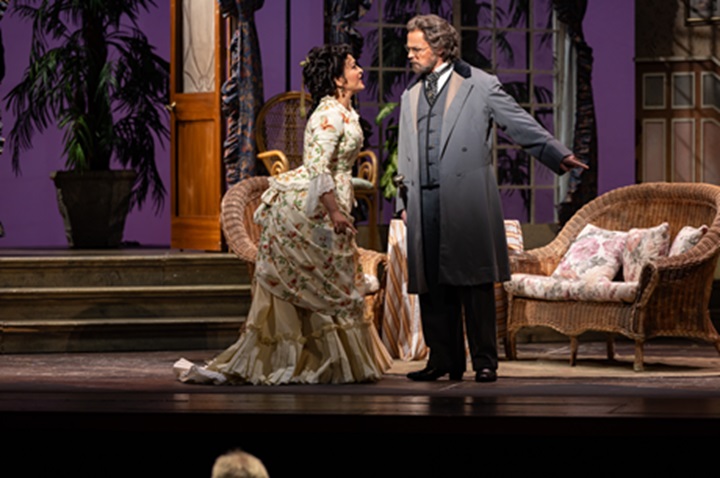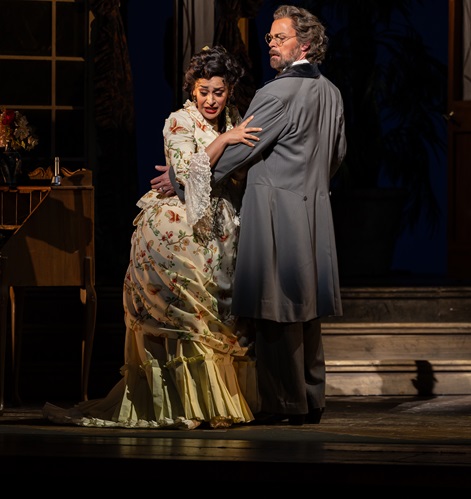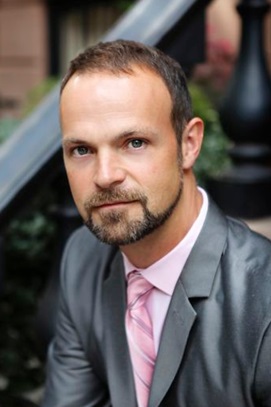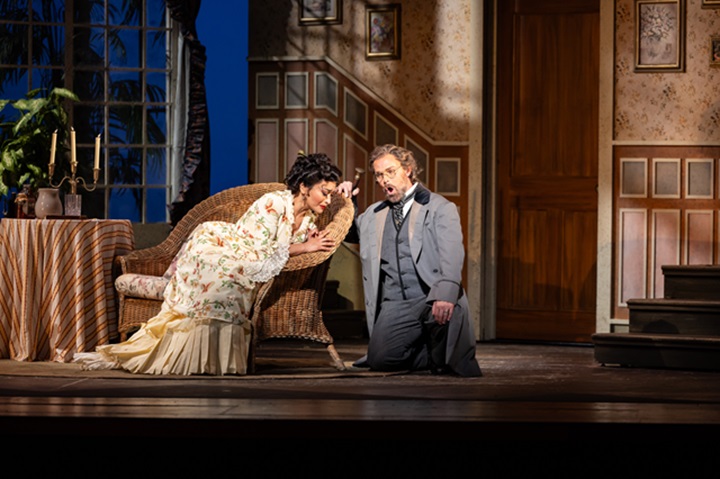
Photographer: Edward Leal
Cecilia Violetta López as Violetta and Troy Cook as Georgio Germont in Florida Grand Opera's production of “La Traviata” with performances in Miami and Fort Lauderdale at the Adrienne Arsht Center and at the Broward Center for the Performing Arts.
Troy Cook is singing Giorgio Germont, the role of the stern father to Alfredo, in Florida Grand Opera's "La Traviata" at the Adrienne Arsht Center for the Performing Arts and at the Broward Center for the Performing Arts. The character, Germont, feels he must split up his son's love affair with Violetta, a courtesan, famous in Parisian society.
miamiartzine.com talked to the baritone about his history with Florida Grand Opera, about the role he is playing and what he sees as the future of opera.
miamiartzine.com: You were a Florida Grand Opera Studio Artist and audiences may recognize you from when you were here in 2017 as Enrico in FGO's production of "Lucia di Lammermoor."Troy Cook: I spent a lot of time in South Florida because of Florida Grand Opera. I was here in the 1998-99 season as a studio artist. FGO gave me my earliest start and some of my earliest training. So, I wouldn't be doing what I'm doing and what I have done now for the last oh, 25 years, or something like that if it wasn't for them.
maz: What's it like to come back?

Photographer: Edward Leal
Cecilia Violetta López as Violetta and Troy Cook as Georgio Germont in Florida Grand Opera's 2023-24 production of Giuseppe Verdi's “La Traviata.”
TC: When you come back to a place where you were an apprentice artist, it always feels like you're coming home. It's like, your company. And there are still people here, friendly faces, that were working for the company then.
maz: What's your favorite part of the process of preparing for a role like Germont with Florida Grand Opera?
TC: I love to rehearse. For me, rehearsals make me tick and it is the thing I look forward to the most figuring out who these people are in this permutation of the story. For this production, the director, Chia Patino, has done so much research about the woman that 'La Traviata' is based on. What courtesans really were, how much power they wielded, how much money they had versus what we think of them. At that time, it was one of the few ways for women in that time to be powerful.

Baritone Troy Cook returns to Florida Grand Opera where he trained in the late 1990s in its studio program.
maz: What do you feel is the big moment for your character?
TC: It is when he confronts Violetta (Act II, Scene 1). Alfredo (his son) is out of the house and (Germont) just shows up. And he tells her, basically, "You are breaking up my family. I need you to knock it off." It is the big scene, which is the pivotal moment for Violetta. If she had said, "Absolutely not, get out of my house . . ." It's interesting to see her switch from this powerful woman to now falling in love and her vulnerability coming in.
The dad knows that the one thing that will undermine her is to talk about her fading beauty because that has been the source of her power. And saying to her, "So, what happens after you get married and the lust fades and you're out here in the country and you start to get bored? Your skin is going to start to wrinkle, and all these things are going to happen. What do you think is going to happen to Alfredo?" It's brutal. He hits a nerve, and she changes. So, for me, for the audience, it's that scene that is the pivotal scene. Verdi has written the music so spectacularly, so well.
maz: What made you choose opera as a career?
TC: I always had an aptitude as a kid. I had always had an aptitude for music. I could sit on the piano bench and play by ear. No one taught me and my mom would come into the living room. And she would say, "Who taught you that?" But it was just something I could do. It just made sense to me. Then, I guess, that translated into being in church choir, singing solos, and that sort of thing. I wrote a little bit of music. For my graduation, I wrote a song for our chorus. And then I went to college, and there was a language requirement, and I just fell in love with language. So, for me, the singing and classical music combined with language, and the prose and the poetry and the text of the classical arts, of opera, all of that started to speak to me. I decided I wanted to be an opera singer before I had seen one, or even been in one.

Photographer: Edward Leal
Cecilia Violetta López as Violetta responds to Troy Cook as Georgio Germont's urging in Florida Grand Opera's production of “La Traviata.”
maz: Opera, like many of the performing arts, has had a difficult time getting people back into the theater since the pandemic. What do you think is a way to get audiences back and, more importantly, to get new audiences?
TC: For new audiences, I like to tell them opera is theater first. You have to come with the mindset that you're going to see a movie. It's really about the story. And all the virtuosic things, all of the grand scale and everything serves the story. So, sit back in your seat, and let yourself get involved with the characters. We have school kids that come to our final dress rehearsals; that's our preview. I think they're always the best audiences because they cheer the heroines and the villains. They get involved in a way that I wish the adult audiences would because they don't have this "Oh, we have to be proper," they just go with it. I just did an opera version of "The Shining." It's getting done quite a bit. It premiered maybe six years ago, and it has had pretty good success. Where I sang it, in Colorado, actual shrieks were coming from the audience. People were screaming because they were scared and in an opera. So, I encourage the audience to come with that kind of mindset. Just enjoy the story. And think of Verdi's music as if it's like a film score, setting the mood and the tone. You hear the low strings as Germont enters the room, and you're like, "Oh, something, something bad's about to happen."
Florida Grand Opera’s “La Traviata” in Miami, 7 p.m. Saturday, Nov. 11; 2 p.m. Sunday, Nov. 12; 8 p.m. Tuesday, Nov. 14, and 7:30 p.m. In Fort Lauderdale, Thursday, Nov. 30, and Saturday, Dec. 2 at the Adrienne Arsht Center for the Performing Arts, 1300 Biscayne Blvd., Miami, and Broward Center for the Performing Arts, 201 SW 5th Ave., Fort Lauderdale. Tickets $22, $25, $34, $44, $48,$49, $53, $55, $75, $78, $84, $85, $90, $94, $105, $133, $143, $145, $160, $169, $185, $200, $210 depending on performance and venue. 800-741-1010 or fgo.org (Sung in Italian with projected translations in English and Spanish)




